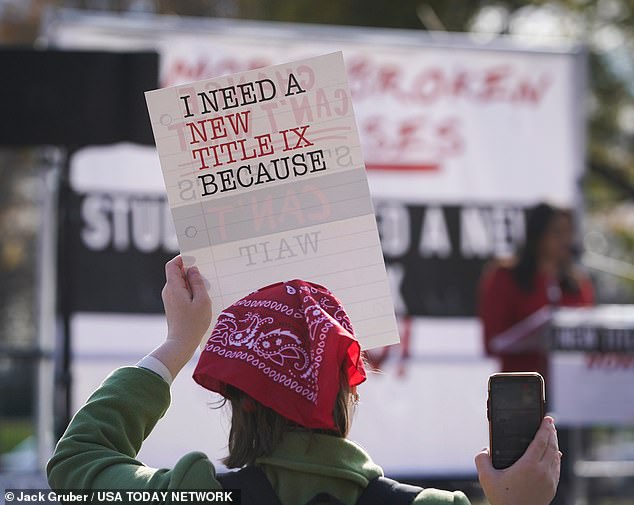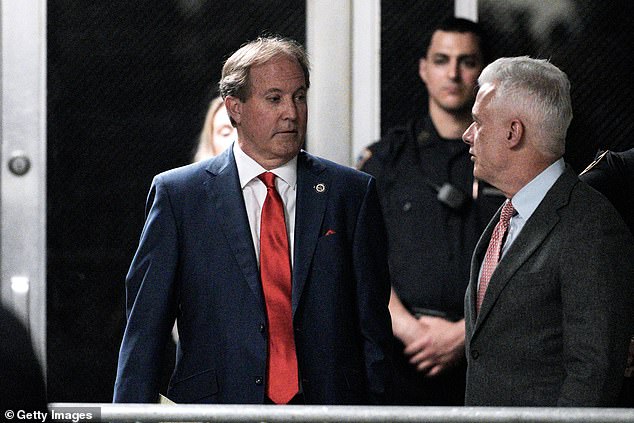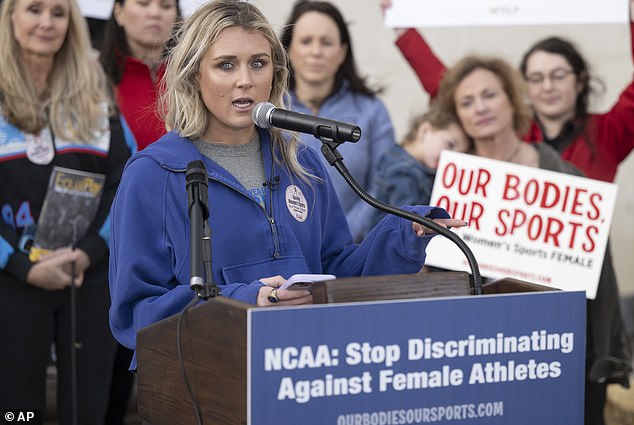Former NCAA swimmer Riley Gaines criticized the Biden administration’s new rules increasing protections for LGBTQ+ students as “anti-women” and vowed to fight them in court with top Republican lawyers.
Gaines has joined nine Republican-led states and several conservative groups fighting new rules that prohibit federally funded schools and universities from discriminating against students based on their gender identity.
“Let’s be clear, this is the most anti-woman, anti-reality pursuit we’ve seen from this administration yet,” Gaines said in an online briefing Tuesday.
By expanding protections to trans students, the Biden administration is making it easier for biological males to compete on women’s and girls’ sports teams at schools and colleges, Gaines said.
Former NCAA swimmer Riley Gaines called the Biden administration’s rules an “anti-woman, anti-reality pursuit”

The Biden administration’s new Title IX rules were released on April 19 after months of delays.
“Allowing men to compete and win in women’s sports is risky,” said the former University of Kentucky swimmer.
‘It is unfair. It is discriminatory and regressive. And this must stop.’
Gaines has become one of America’s staunchest voices against allowing biological men to compete against women, after competing and losing to male-to-female trans competitor Lia Thomas at the 2022 NCAA Championships. .
At least three federal lawsuits were filed Monday seeking to overturn the new rules.
Cases were filed in Alabama, Louisiana and Texas, with support from GOP-led states.
Tennessee and West Virginia also pledged a “multistate response” Tuesday.
The lawsuits are the first to challenge Biden’s new Title IX rules, which expand protections for LGBTQ+ students and add safeguards for victims of sexual assault.
The policy was issued on April 19 and goes into effect in August.
The US Department of Education says the rules clarify the prohibition against discrimination based on sex contained in Title IX of the Education Amendments of 1972, which prohibits discrimination based on sex in education.

Republican Texas Attorney General Ken Paxton’s lawsuit criticized a “radical social change” in the nation’s schools.
Under the new rules, Title IX will also protect against discrimination based on sexual orientation or gender identity.
The department cited a 2020 U.S. Supreme Court ruling in favor of LGBTQ rights, under a different law.
Title IX applies to both public and private schools, and nearly all accept some form of federal funding nationwide.
In a lawsuit filed Monday, Republican Texas Attorney General Ken Paxton said the 2020 Supreme Court decision was not relevant.
Their lawsuit called it a federal overreach that attempts to bring “radical social change” to the nation’s schools.
The lawsuit, along with another filed by Republican state attorneys general in Louisiana, Mississippi, Montana and Idaho, argued that the regulations unlawfully interpret Title IX in a way that conflicts with the text of the statute.

Gaines lost to male-to-female trans swimmer Lia Thomas at the 2022 NCAA Championships
They maintain that it defines “sex” as the biological sex of a person.
A third lawsuit filed by Alabama, Florida, Georgia, South Carolina and three advocacy groups challenged that provision, as well as parts of the regulations that they said expand the definition of sexual harassment and require schools to review how they address complaints.
The lawsuit says the new, broader ban against harassment would have the effect of forcing students to use someone’s preferred pronouns or face the risk of an investigation for mistaking someone’s gender.
The states said that unless the regulations are rescinded, schools will have to allow transgender students to use bathrooms and locker rooms that conform to their gender identities.
Paxton filed his lawsuit in federal court in Amarillo, whose only active judge, U.S. District Judge Matthew Kacsmaryk, is an appointee of former Republican President Donald Trump, who often rules against LGBTQ rights.
The Biden administration’s new rules were proposed nearly two years ago, with a public comment period that garnered a record 240,000 responses.
The policy reverses many of the changes implemented during the Trump administration, which added more protections for students accused of sexual misconduct.


